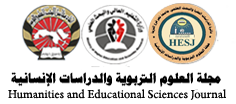The degree of practising integrity values for secondary school teachers in Bisha Province from the supervisors' and school leaders' perspectives Munirah Ssaif Faraj Alshahrani Student
Keywords:
Integrity Values, Practising Degree, School Leaders, SchoolAbstract
This study aimed to demonstrate the degree of practising integrity values for secondary school teachers in Bisha city from supervisors and school leaders' perspectives. It also pointed out the effect of gender, type of work, and years of experience on the degree of practising integrity values for secondary school teachers. The study population and sample consisted of all the supervisors and leaders of schools in the secondary school at Bisha in the first semester of the academic year (1441-1442 AH). The participants' number was (256) includes supervisors, supervisors, leaders and leaders.
To achieve the objectives of the study, the researcher applied a questionnaire consisting of (49 items) distributed into three domains: values of personal integrity (16 items), values of professional integrity (15 items), and values of social integrity (18 items). The study tools validity and reliability were verified.
To answer the study questions, the researcher used the statistical techniques represented in the description analysis, which included means, standard deviations and percentages, and Inferential analysis, which includes Mann-Whitney and Kruskal-Wallis tests.
The study concluded that high school teachers' practice of integrity values in Bisha governorate was high. The third dimension related to social integrity ranked first, followed by personal integrity in the second rank, and the dimension related to professional integrity, which ranked third. The study also found statistically significant differences in the gender variable favouring females, while there were no statistically significant differences according to the type of work variable in the two dimensions: personal integrity values and social integrity values. Also, the study found that there are statistically significant differences according to the work type variable in favour of a group Supervisor in the dimension of professional integrity values. Moreover, there are statistically significant differences between the average degree of practising integrity values of secondary school teachers from supervisors and school leaders perspective according to the variable years of experience in favour of the category "from 5 years to 10 years".
In light of the research results, the researcher suggested several recommendations, the most important of which are organising workshops and training courses for male and female teachers, raising awareness advice to supervisors and school leaders on practising and enabling integrity values.





